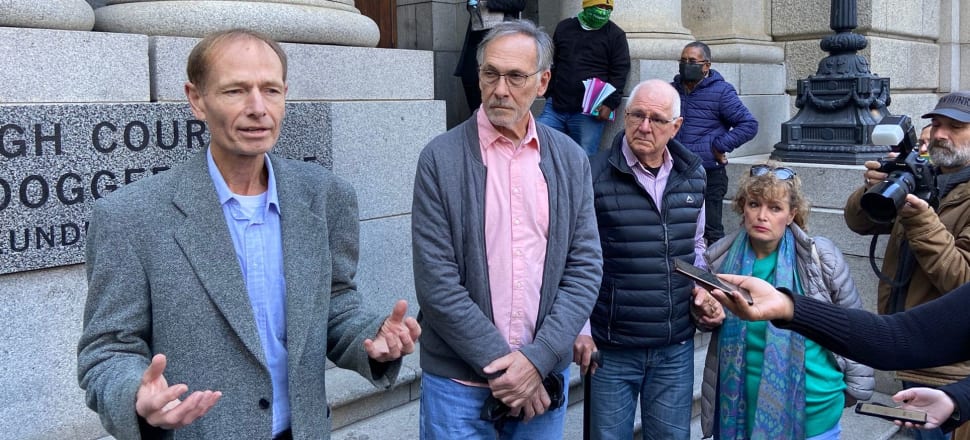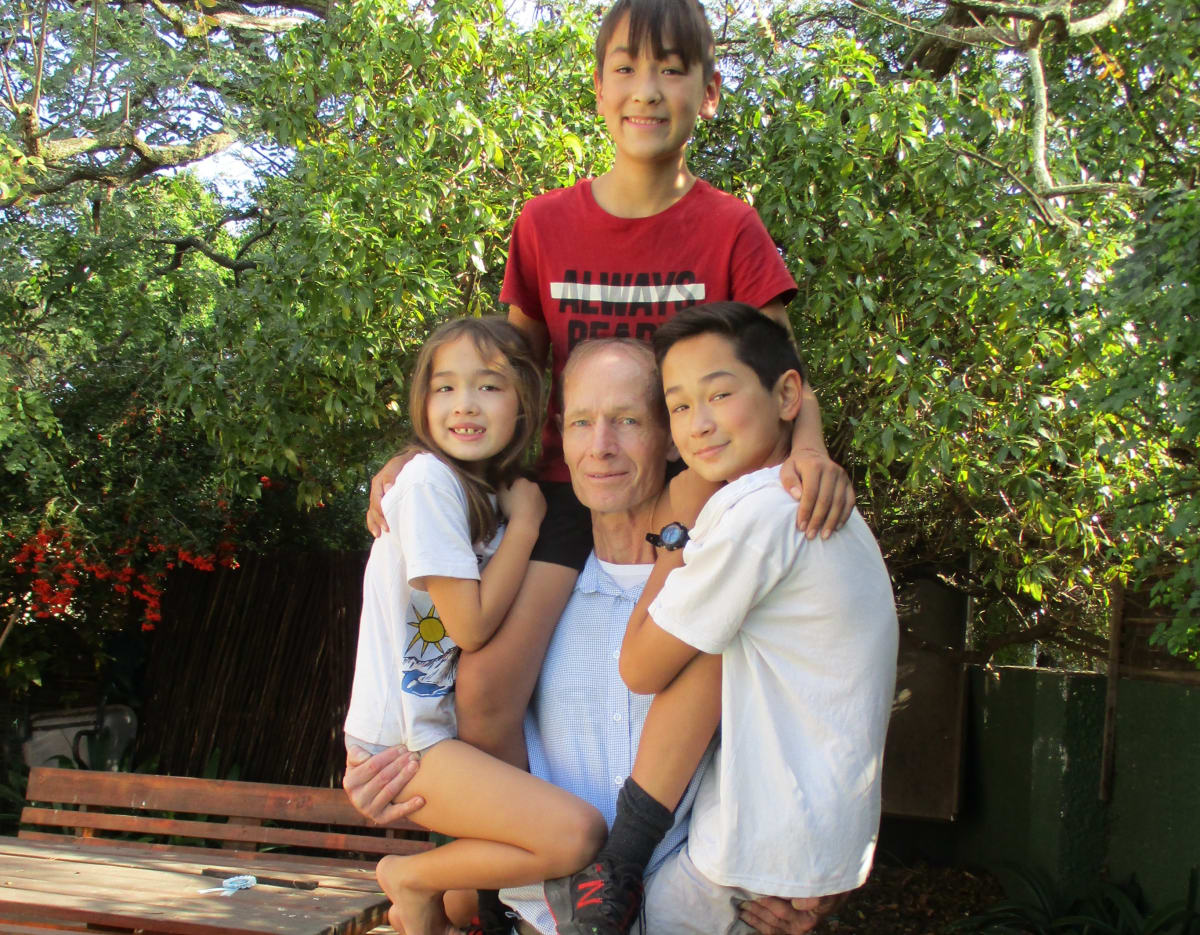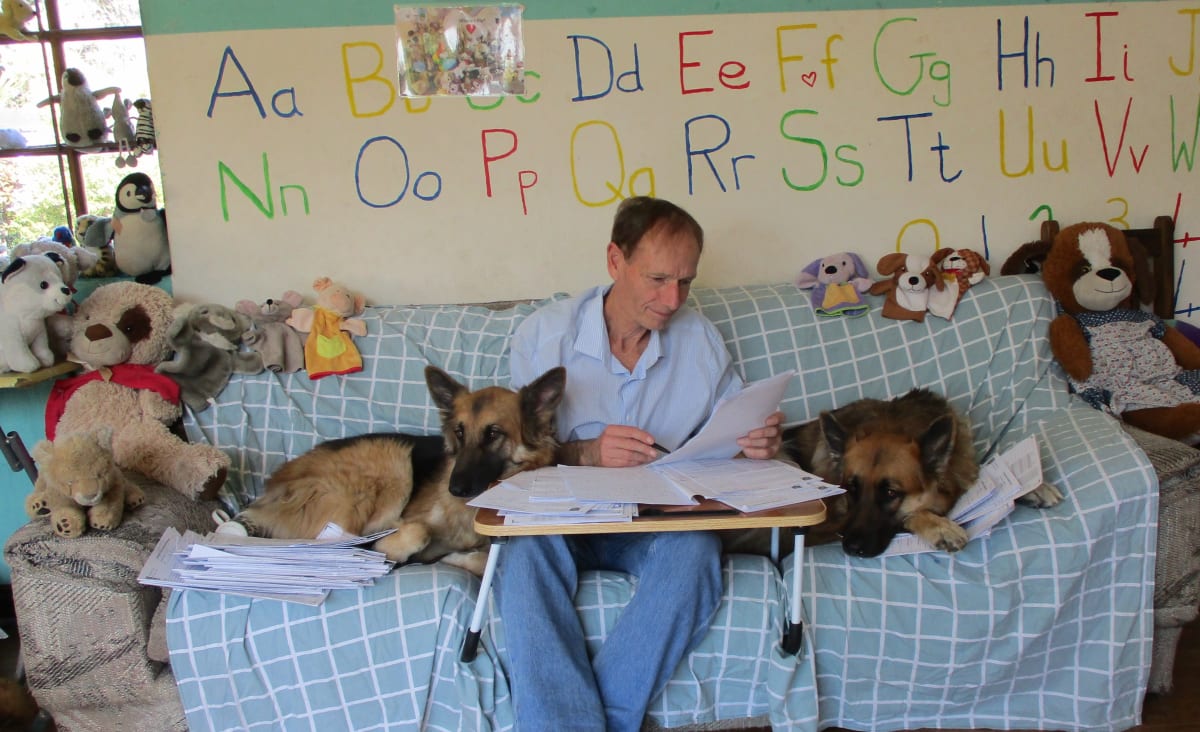
NZ-born Sean Davison had a stash of fake and duplicate passports ready so he could avoid a lengthy jail sentence for aiding the suicides of three severely disabled men
"Yes, I did obtain a fake passport," Sean Davison admits. "It's rather easy to do in South Africa. This does make me seem like a hardened criminal, but you need to appreciate the circumstance in South Africa."
The New Zealander is speaking to Newsroom on completion of a three-year sentence of home detention. It was served at the house where he, his wife Raine and their three children live in Pinelands, Cape Town. Since first serving home detention in New Zealand for assisting the suicide of his cancer-ravaged mother, Davison has become an international champion of the right to die with dignity. He counted Archbishop Desmond Tutu among his friends and supporters. But it came at a cost that sometimes seemed too overwhelming, for him and his family.
READ MORE:
► GG refuses mercy killing pardon for scientist at end of sentence
► Exclusive extract: ‘Help to die in order to end their hell on earth’
► Calls to pardon those who help dying friends end their lives
► ‘I do acknowledge the anguish you must have felt’ – Justice Minister
► Plea to NZ Governor-General for presidential-style pardon
"Many highly respectable people were advising me to skip the country to avoid jail. I did seriously consider leaving," he says. "I was charged with premeditated murder which carries a mandatory life sentence – there didn’t seem any hope of avoiding time in prison, especially with three such charges.
"South African prisons are notoriously violent, dangerous places – nothing like a prison in New Zealand. People who spend time in a South African prison do not come out the same person that went in. The prospect of prison here was a horrific one."
In the end, he believes it was the prospect of having to call Archbishop Tutu to court that persuaded the Crown prosecutors to settle for a lesser sentence of home detention. The defence and prosecution had discussed the possibility that Tutu, who died last year, was technically complicit because he corresponded with Davison about the New Zealander's publicised, planned involvement in the death of Justin Varian.
Varian, 52, who was almost entirely incapacitated by motor neurone disease, died with the use of a bag of helium. Davison has admitted his involvement in Varian's death, and those of Anrich Burger and Richard Holland, both severely injured in road accidents.
South Africa does not have a charge of assisted suicide on its law books, so Davison was charged with the murder of all three men – but nobody else was charged. Davison made a plea bargain to accept murder charges, and avoid a jail term.
Last night, after three years' home detention, Davison emerged from the High Court to a gaggle of international media. He spoke on the courthouse steps. "I have done my time. But I did not commit a crime,” he told them.
“This is no longer about me. This is about the fact that other people will find themselves in the same position that I was in. It is about the fact that other people will find themselves in the same position as the three men I helped to die."

For a long time, though, the attention of the police and the courts has been entirely on Davison – and he feared he would be sentenced to life imprisonment, unable to see his children – Flynn, Finnian and Fia – grow up. And he worried that the court might withdraw his bail at any time and remand him in custody.
So he set in place contingency plans to allow him to skip the country at short notice, he tells Newsroom. One friend offered him the use of his ocean-going yacht; others suggested he cross the mountainous border into Lesotho.
"With my wife’s agreement, I did consider it, and I did plan how to do it. I was going to leave through Lesotho, a landlocked country within South Africa’s borders, which has an international airport.
"It must be shocking for people in New Zealand to think that I would consider doing this, but if they had a concept of a South African prison, they would probably understand."
"If I were arrested and charged for the same offence in New Zealand, I would not have accepted a plea bargain and pleaded guilty to murder, but gone to trial. I believe a New Zealand court would not have found me guilty of murder."
Davison had been ordered to surrender his NZ and South African passports to police and, he says, by implication to not apply for new ones. His new book, The Price of Mercy, describes a dream sequence in which he obtains a fake passport in order to cross the border into Lesotho.
“I am surprised how easy it was getting a fake passport. I suppose I shouldn’t be focusing right now on how this country is drowning in corruption, from the government down. To obtain it, I only have to mingle among the dodgy characters hanging around outside the Department of Home Affairs in Barrack Street in the centre of Cape Town. It doesn’t take too many questions before I am hooked up with the right person, and by the end of the day I have it. Mind you, it doesn’t come cheap. I guess the cost is probably determined by how desperate you look (they had me on that). Regardless of the cost, this document is priceless, and could become my lifeline out of here.”
He says he really did obtain that fake South African passport. He also discloses a New Zealand passport that he was able to obtain online by claiming he had lost his existing Kiwi one, "which, in reality, had been confiscated by the police".
Now, at the end of his home detention sentence, Sean and Raine are deciding where they will live. Although Davison is still a professor at the University of Western Cape, which has supported him throughout, the family no longer feel safe in South Africa.
One police officer had told him they are investigating further charges.
Davison dismisses that: "I have been convicted of three murders, and served my sentence. I will not be charged with murder again in South Africa, or in anywhere in the world."
Nonetheless, the family is looking to move elsewhere.

"Having a family and trying to change the world don’t always go together. This has been tough on the family," Davison says. "I would prefer a normal life with my kids, but I want to be able to live with myself when I’m there, and not be ashamed of what I didn’t do, helping those three men.
"I want to leave South Africa. We had already started a new life in Australia, and were considering moving to New Zealand, when I was arrested in South Africa. Now, with a murder conviction I’m not allowed to enter Australia, and with my professional misconduct conviction in New Zealand I will struggle to find work there. The options for the future are very limited now I’m a convicted murderer."
Davison still loves New Zealand, despite being deregistered by the Medical Sciences Council because of his convictions. "My feelings for New Zealand could never be soured," he says.
"I was born in Auckland, spent almost my entire childhood in Hokitika, and nine years in Dunedin studying for my PhD – New Zealand is in my blood and I will always love the place."
But he won't move his family to New Zealand. "The reason for not returning is the extreme difficulty of ever finding a job there with a professional misconduct conviction. My sister Jo, a teacher, said I wouldn’t even get a job teaching maths or science in a secondary school in NZ with this conviction."
He was dismayed at being deregistered, and says it has undermined his confidence in New Zealand's medical fraternity to fairly serve the needs of those seeking their assistance to die under the new End of Life Choice Act.

"I think there is a high danger that the doctors will make the new law very restrictive," he says. "Doctors do play an important role in implementing the new law, but there are serious questions about the influence they have. In particular a psychiatrist’s ability to make an objective assessment of a person’s mental competence. Often the fact that a person wants to end their life leads to a medical assumption that they are not mentally competent.
"I do feel New Zealand has got the law about right, but it can be improved," he added. "We need to look at the role of doctors in the process.
"We need to look closely at the issue of mental illness, where people are excluded from the option of an assisted death in NZ. There are mental illnesses where the person is perfectly mentally competent to decide about their suffering, and whether their life is worth living. Sometimes a depressed person can make a more rational decision than a happy person."
Helpline services are available right now in New Zealand that offer support, information and help for you and your parents, family, whānau and friends. All the services listed here are available 24 hours a day, seven days a week unless otherwise specified.
► Need to talk? Free call or text 1737 any time for support from a trained counsellor.
► Lifeline – 0800 543 354 (0800 LIFELINE) or free text 4357 (HELP).
► Suicide Crisis Helpline – 0508 828 865 (0508 TAUTOKO).
► Healthline – 0800 611 116
► Samaritans – 0800 726 666







